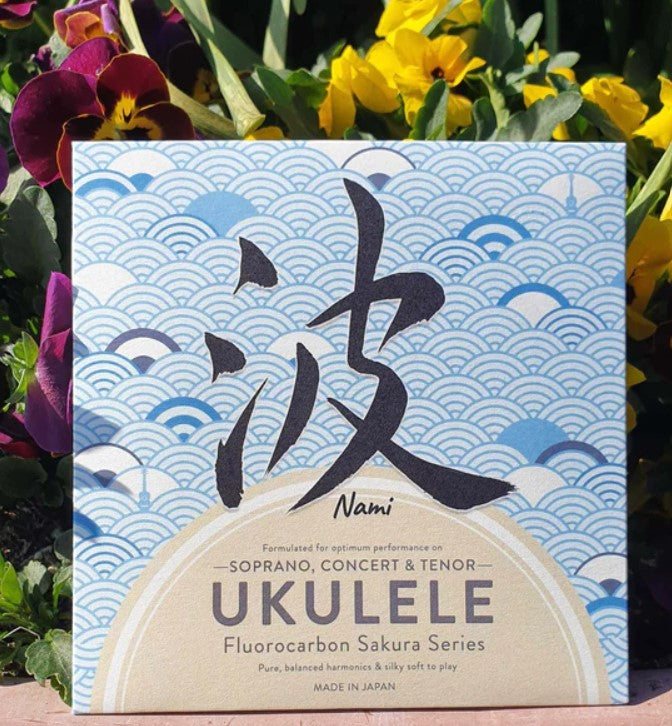Unraveling the Ukulele String Showdown: Nylon vs. Fluorocarbon!

If you're a ukulele enthusiast or just starting to explore the joy of playing this delightful instrument, you might have come across various string options, each promising its own unique benefits.
Among these options, two popular contenders stand out: nylon and fluorocarbon strings.
Whether you're looking to achieve a classic, warm resonance or prefer a modern, clear tonality, understanding the nuances between nylon and fluorocarbon strings will undoubtedly help you unlock the full potential of your ukulele.
So, What is the difference between nylon and fluorocarbon strings for ukuleles? Let’s find out.
String 'Em Up: A Nylon Symphony
Let's start with the good ol' classic: nylon strings. Think of them as seasoned veterans of the ukulele world. Nylon strings have been serenading ukes for eons, and their warm, mellow tone has stolen the hearts of countless players.
They're like that trusty pair of sneakers you can't help but wear everywhere - comfortable and familiar. With a softer touch and gentle sound, nylon strings are perfect for beginners, providing a forgiving playing experience as you strum your way to ukulele glory.
Fluorocarbon: The New Kid on the Block
But wait, who's this dazzling newcomer stepping into the spotlight? Enter fluorocarbon strings, the flashy divas of the ukulele universe! Picture a fusion between nylon and fishing line, with a dash of magic thrown in for good measure.
These strings boast a snappy, crystal-clear tone that'll make your ukulele sing like never before.
Fluorocarbon strings are all about precision and projection, offering a brighter sound with a snappier attack. If you're aiming to shred like a ukulele rockstar, these strings will be your trusty sidekick, cutting through the mix like a pro.
Battle of the Titans: Playability and Tension
Now, let's pit these contenders against each other in a friendly duel. Nylon strings typically have a lower tension, making them easier on the fingers and ideal for those long jamming sessions.
They're also kind to ukuleles, especially older ones, as they exert less pressure on the instrument's delicate frame.
On the other side of the ring, fluorocarbon strings might require a bit more finger muscle but offer a more responsive playing experience. If you're into fingerpicking or complex chord progressions, you'll find these strings to be a nimble partner in crime.
Weather Wars: Nylon's Achilles Heel
While nylon strings bring sunshine and smiles to our ukulele escapades, they have a weak spot - humidity. When the weather takes a turn for the muggy, nylon strings tend to stretch and lose their tune.
Picture a ukulele that sounds like it's taken a dip in a wobbly wading pool - not the most harmonious experience!
Enter the caped crusader - fluorocarbon strings! These fearless fighters can withstand humidity like champs, retaining their pitch and stability even when the humidity levels try to play tricks on your tuning.
The Price Tag Tango
Ah, the big bucks! When it comes to cost, nylon strings are the budget-friendly option, making them the go-to choice for many players, especially beginners or those just dipping their toes into the ukulele sea.
Fluorocarbon strings, on the other hand, might make a little dent in your pocket, but the sonic rewards might just be worth it if you're seeking that professional-grade sound.
Get more strings HERE.
Choosing Your String Serenade
As the curtain falls on this ukulele string showdown, the choice between nylon and fluorocarbon ultimately boils down to your personal taste and playing style.
If you crave the warm embrace of a mellow melody, nylon strings will have you strumming with a smile.
But if you're on a quest for clarity and precision, fluorocarbon strings will take your ukulele escapades to soaring heights.
Remember, experimenting with different strings can be an exciting journey of self-discovery. So, why not give both nylon and fluorocarbon strings a whirl? It's the perfect excuse to expand your ukulele collection and find that unique sound that resonates with your musical soul.
And there you have it - a harmonious harmony of information on the delightful duel between nylon and fluorocarbon strings. Now go forth, dear ukulele virtuosos, and let your strings sing their stories, one strum at a time! Happy strumming! 🎶
 Lifetime Warranty
Lifetime Warranty  60 Day Returns Policy
60 Day Returns Policy 1-2 Day Delivery
1-2 Day Delivery 

































I’m trying to figure out what strings to use on my Cordoba tenor ukulele 20 tm-ce.
I may want to try low g but the Cordoba is nice but it’s a little bit hard to play for some reason. I don’t know if picking a certain set of strings might make it a little warmer sounding or something. I make contact Cordoba
Thanks for comprehensive discussion, I now use fluorocarbon strings on my KALA Tenor and my ENYA concert; fluorocarbon are the fitted strings on the purchased ENYA
Do you guys carry GHS tenor low G complete set?
Also Oasis tenor Low G set ?
Thanks in advance
Leave a comment